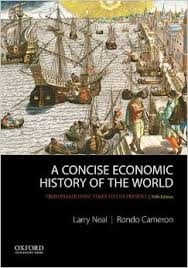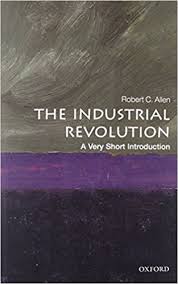Syllabus ECON 5101 Economic History of Europe
Course and Instructor Information |
Course Title: Economic History of Europe ECON 5101
Credits: 3
Prerequisites: Graduate standing or permission of the instructor
Instructor: Richard N. LangloisE-mail: richard.langlois@uconn.edu
Phone: (860) 486-3472
Course Materials |
Required Text: How the World Became Rich: The Historical Origins of Economic Growth by Mark Koyama and Jared Rubin, Polity Press, 2022. Recommended Text: A Concise Economic History of the World
by Larry Neal and Rondo Cameron. Oxford University Press, 5th edition, 2016. (Earlier editions are fine. The fourth edition is available on archive.org.)Recommended Text: The Industrial Revolution: a Very Short Introduction
by Robert C. Allen. Oxford University Press, 2017.Recommended Text: Guns, Germs, and Steel by Jared Diamond W. W. Norton and Company, 1999. (Available on archive.org.)
Course Description |
This course studies the economic development of Europe from prehistoric times to the early twentieth century. Although the course is chronological, the vastness of such a history necessarily means that we will be selective in our treatment, focusing on a few episodes and approaches. In general, the course will try to explain the uniqueness of Western Europe. Why was Western Europe (including Great Britain) able to achieve sustained economic growth in a way that no other part of the world - including the great civilizations of history - was able to do?
The course will meet with the undergraduate version of the course, ECON 2101, but will have different assignments. Students in the graduate version of the course will write three 5-8 page papers over the course of the semester and take the same final exam as students in ECON 2101. The three papers and the final will each count 25 per cent of the grade.
Sequence of topics |
- Theories of Economic Growth
- Richard N. Langlois, "The Great Question," manuscript.
- Jared Diamond, Guns, Germs, and Steel (Norton, 1999).
- Larry Neal and Rondo Cameron , A Concise Economic History of the World (Oxford, 2016), chapter 1.
- Gregory Clark, A Farewell to Alms (Princeton, 2007), chapter 2. (This book is available as an e-book from the Homer Babbidge Library. If you are able to check it out – which you may not be if others are using it – you might want to look at some of the other chapters, especially chapters 1 and 10.)
- Health and economic growth.
- Niall Ferguson on the six "killer apps" of prosperity.
- Ancient Economies
- David Reich, Who We Are and How We Got Here: Ancient DNA and the New Science of the Human Past (Pantheon, 2018), pp. 93-121.
- Larry Neal and Rondo Cameron , A Concise Economic History of the World (Oxford, 2016), chapter 2.
- North, Douglass C. and Robet Paul Thomas. 1997. "The First Economic Revolution," The Economic History Review 30(2): 229-241.
- Jane Jacobs, The Economy of Cities. New York: Random House, 1969, chapter 1.
- Peter Temin, "The Economy of the Early Roman Empire," The Journal of Economic Perspectives 20(1): 133-151 (Winter 2006).
- Glenn Hubbard and Tim Kane, "The Ruin of Rome," chapter 4 in Hubbard and Kane, Balance: The Economics of Great Powers from Ancient Rome to Modern America. New York: Simon and Schuster, 2013, pp. 80-107.
- Bruce Bartlett, "How Excessive Government Killed Ancient Rome," The Cato Journal 14(2), Fall 1994.
- Guns, Germs, and Steel.
- The Theory of the State.
- Pax Romana.
- The Medieval Economy
- Larry Neal and Rondo Cameron , A Concise Economic History of the World (Oxford, 2016), chapter 3.
- Gary Richardson, "Craft Guilds and Christianity in Late-Medieval England," Rationality and Society 17(2): 139-189 (May 1, 2005).
- Douglass C. North and Robert Paul Thomas, "The Rise and Fall of the Manorial System: A Theoretical Model," The Journal of Economic History 31(4): 777-803 (1971).
- Richard N. Langlois, "The Institutional Approach to Economic History: Connecting the Two Strands," Journal of Comparative Economics 45(1): 201-212 (February 2017). Read pages 203-206.
- Nicholas Wade, "Scientists Solve Puzzle of Black Death’s DNA," The New York Times, October 12, 2011.
- Meir Kohn, "The Expansion of Trade and the Transformation of Agriculture in Preindustrial Europe." (Manuscript, Dartmouth College.)
- The Black Death.
- The Mercantilist Economy
- Larry Neal and Rondo Cameron , A Concise Economic History of the World (Oxford, 2016), chapters 5 and 6.
- Meir Kohn, "The Organization of Government in Pre-Industrial Europe," manuscript, Dartmouth College.
- Nathan Rosenberg and L. E. Birdzell, Jr., How the West Grew Rich (New York: Basic Books, 1986), chapter 4.
- Avner Greif, "The Birth of Impersonal Exchange: The Community Responsibility System and Impartial Justice," Journal of Economic Perspectives 20(2): 221-236 (Spring 2006).
- Douglass C. North and Barry R. Weingast, "The Evolution of Institutions Governing Public Choice in 17th Century England," Journal of Economic History 49: 803-32 (1989).
- Steve Pincus, 1688: the First Modern Revolution. New Haven: Yale University Press, 2009, Chapter 12, "Revolution in Political Economy."
- Randy Alfred, "March 19, 1474: Venice Enacts a Patently Original Idea," Wired.com, March 19, 2008.
- The Ascent of Money Episode 1: From Bullion to Bubbles.
- The Industrial Revolution
- Larry Neal and Rondo Cameron , A Concise Economic History of the World (Oxford, 2016), chapter 7.
- Gregory Clark, A Farewell to Alms (Princeton, 2007), chapter 12. (Available as an e-book from the Homer Babbidge Library.)
- Joel Mokyr, The Enlightened Economy (Yale 2009), chapters 1 and 15.
- Axel Leijonhufvud, "Capitalism and the Factory System," in R. N. Langlois, ed. Economics as a Process: Essays in the New Institutional Economics, New York Cambridge University Press, 1986 pp. 203-223.
- Richard N. Langlois, "The Coevolution of Technology and Organization in the Transition to the Factory System," in Paul L. Robertson, ed., Authority and Control in Modern Industry. London: Routledge, 1999, pp. 45-72.
- Industrial Revolution: Spinning Mills.
- "The First Industrial Revolution: Perspectives from Before and After," by Professor N.F.R. Crafts, University of Warwick.
- Britain and the World in the 19th Century
- Larry Neal and Rondo Cameron , A Concise Economic History of the World (Oxford, 2016), chapters 8, 9, and 12.
- Niall Ferguson, Empire. New York: Basic Books, 2004, chapter 1.
- Joel Mokyr, The Enlightened Economy (Yale 2009), chapter 8.
- "What Were the Real Penalties of the Early Start?" by Professor N.F.R. Crafts, University of Warwick.
Student Responsibilities and Resources |
As a member of the University of Connecticut student community, you are held to certain standards and academic policies. In addition, there are numerous resources available to help you succeed in your academic work. This section provides a brief overview to important standards, policies and resources.
Student Code
You are responsible for acting in accordance with the University of Connecticut's Student Code Review and become familiar with these expectations. In particular, make sure you have read the section that applies to you on Academic Integrity:
- Academic Integrity in Undergraduate Education and Research
- Academic Integrity in Graduate Education and Research
Cheating and plagiarism are taken very seriously at the University of Connecticut. As a student, it is your responsibility to avoid plagiarism. See Plagiarism: How to Recognize it and How to Avoid It. Copyrighted materials within the course are only for the use of students enrolled in the course for purposes associated with this course and may not be retained or further disseminated.
Netiquette and Communication
At all times, course communication with fellow students and the instructor are to be professional and courteous. It is expected that you proofread all your written communication, including discussion posts, assignment submissions, and mail messages. If you are new to online learning or need a netiquette refresher, please look at this guide titled, The Core Rules of Netiquette.
Academic Support Resources
Technology and Academic Help provides a guide to technical and academic assistance. Students needing special accommodations should work with the University's Center for Students with Disabilities (CSD). You may contact CSD by calling (860) 486-2020 or by emailing csd@uconn.edu. If your request for accommodation is approved, CSD will send an accommodation letter directly to your instructor(s) so that special arrangements can be made. (Note: Student requests for accommodation must be filed each semester.) Blackboard measures and evaluates accessibility using two sets of standards: the WCAG 2.0 standards issued by the World Wide Web Consortium (W3C) and Section 508 of the Rehabilitation Act issued in the United States federal government.” (Retrieved March 24, 2013 from Blackboard's website)



